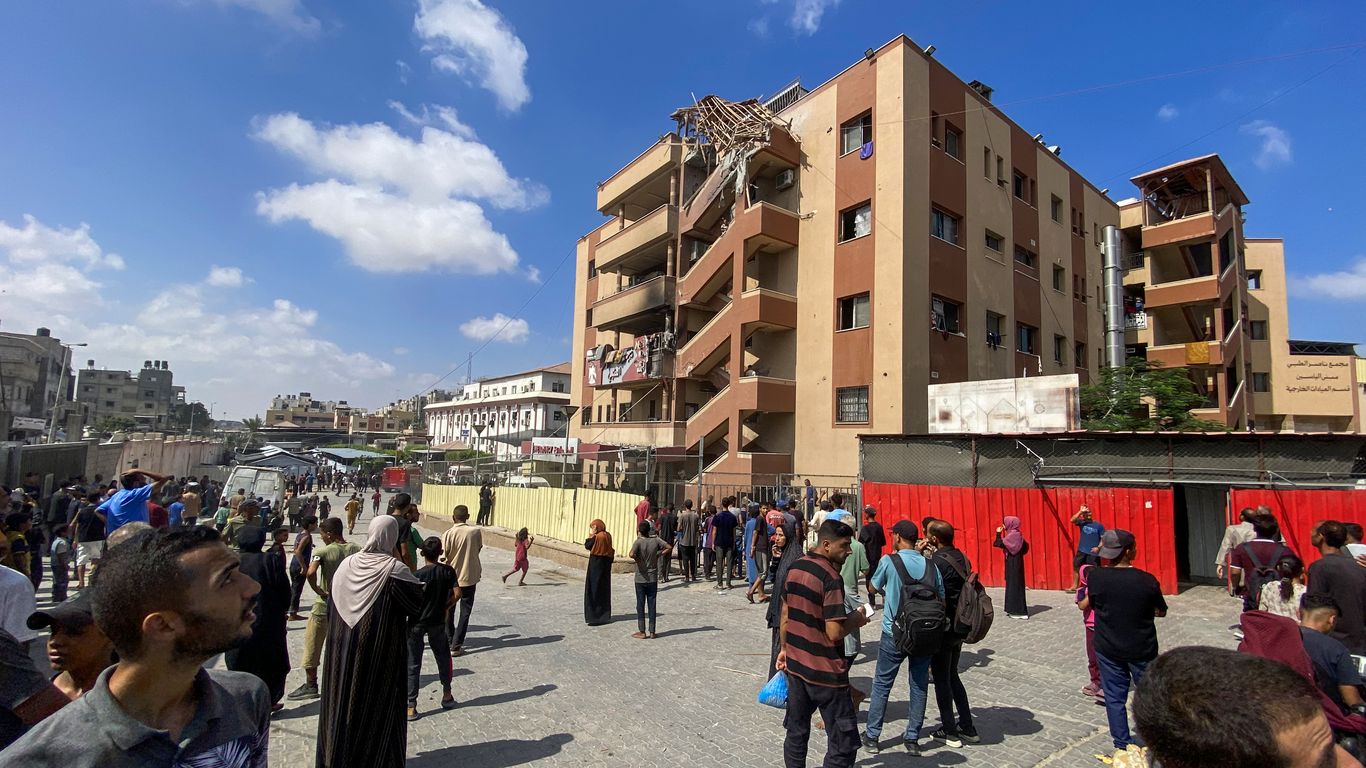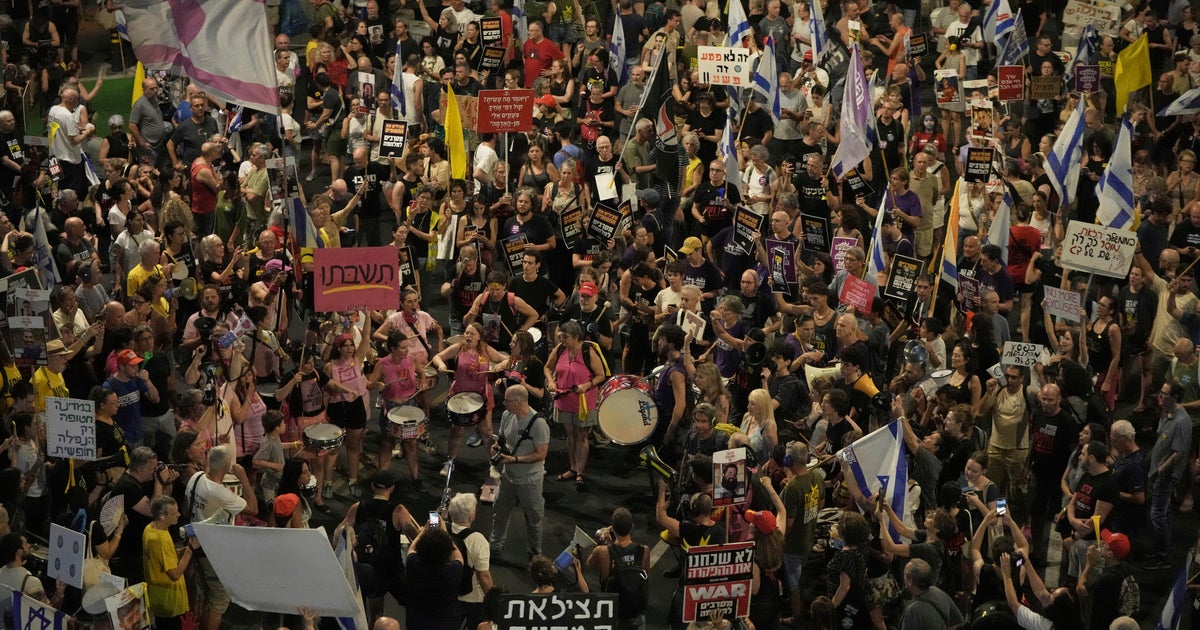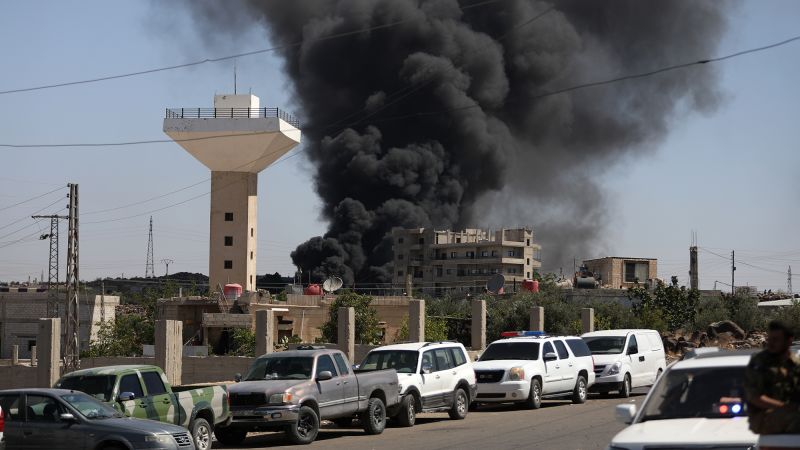Israeli Strike on Sanaa Kills Prime Minister and Ministers: Houthis Accuse Israel of Aggression

Introduction
The Houthis claim that the Israeli strike on Sanaa killed Prime Minister Ahmad al-Rahawi and several ministers. This news has caused shock and outrage in the region, as well as globally. The Houthis are a Shia rebel group that controls much of northern Yemen, including the capital, Sanaa. This attack is seen as a major escalation in the ongoing conflict between the Houthis and the Saudi-led coalition, of which Israel is a key ally. The strike has also sparked concerns about the involvement of Israel in Yemen's civil war.
Key Details
The attack took place on Thursday and targeted the presidential palace in Sanaa, where the Houthis had set up their base. Several high-ranking officials were killed, including Prime Minister Ahmad al-Rahawi and several ministers. The Houthis have accused Israel of carrying out the strike, with one spokesperson stating that "the aggression was carried out by the forces of aggression, led by Israel."
Impact
This attack has further complicated the already complex situation in Yemen and raised concerns about Israel's involvement in the conflict. It also highlights the growing influence of Israel in the Middle East and its willingness to engage in conflicts beyond its own borders. The strike has also caused tension between Israel and Iran, as Iran is a key supporter of the Houthis and has been accused of providing them with weapons. This
About the People Mentioned
Ahmad al-Rahawi
Ahmed Ghaleb Nasser al-Rahawi, commonly known as Ahmed al-Rahawi, was a prominent Yemeni politician who played a significant role in the Houthi-led government. Born in the Abyan Governorate, Yemen, he was a member of the influential Al-Rahawi tribe. His father, Ghaleb Nasser al-Rahawi, was also a political figure who was assassinated in the 1970s, which likely influenced Ahmed's entry into politics[2][5]. Al-Rahawi held various local government positions, including Director General and Chairman of the Local Council of Khanfar District, Deputy Governor of Al Mahwit Governorate, and Governor of Abyan Governorate. His experience in managing Yemen’s fractured regional politics was crucial in his rise to national prominence[2][5]. In 2019, he was appointed to the Supreme Political Council, the highest governing body in Houthi-controlled areas of Yemen, further solidifying his position within the Houthi movement[1][2]. On August 10, 2024, al-Rahawi was named Prime Minister of the Houthi Government of Change and Construction. As Prime Minister, he became a leading figure in the Houthi political project, balancing tribal allegiances with the group's Iran-aligned ideology[1][2]. His leadership was marked by support for resistance movements across the Middle East, including Hezbollah in Lebanon[1]. Tragically, Ahmed al-Rahawi was killed in an Israeli airstrike on August 28, 2025, targeting senior Houthi leaders. His death was seen as a significant blow to the Houthi movement and is expected to further destabilize the fragile political balance in Yemen, intensifying regional tensions involving Israel, Iran, and Saudi Arabia[1][2]. Following his death, his position was transferred to his deputy, Muhammad Ahmed Miftah[5].
About the Organizations Mentioned
Houthis
The Houthis, officially known as **Ansar Allah**, are a Zaydi revivalist and Islamist political-military organization that emerged in Yemen in the 1990s, drawing leadership primarily from the al-Houthi family[1]. Initially a small, localized movement opposing perceived government corruption and foreign influence, the group has transformed into a major regional actor with significant influence over Yemen’s political and military landscape[5]. The Houthis are predominantly Zaydi Shia Muslims, a minority in Yemen, and are widely seen as part of the Iranian-led “Axis of Resistance,” receiving substantial support from Tehran[1][3]. ## History and Evolution The Houthi movement began as the “Believing Youth,” a religious revivalist group, but gained prominence in 2004 when its founder, Hussein al-Houthi, was killed by Yemeni forces, sparking a series of uprisings known as the Houthi Wars[1][6]. Over the next decade, the group capitalized on Yemen’s political instability, notably during the Arab Spring, to expand its territorial control[6]. In 2014, the Houthis seized the capital, Sanaa, and by early 2015, they had dissolved the government, prompting a Saudi-led military intervention that escalated into a full-blown civil war[6][7]. Despite initial setbacks from coalition airstrikes, the Houthis not only survived but grew stronger, adapting their organizational structure and military tactics[5]. ## Key Achievements and Current Status The Houthis’ most notable achievement is their consolidation of power over much of northern Yemen, including the capital, despite international isolation and military opposition[5][6]. They have demonstrated resilience against one of the region’s most powerful militaries (Saudi Arabia) and have developed sophisticated missile and drone capabilities, reportedly with Iranian assistance[1][3]. Their attacks on international shipping in the Red Sea have
Israeli
The query "Israeli" does not correspond to a specific organization but rather refers broadly to entities related to Israel. Based on the search results, there is no single organization named "Israeli" to profile. Instead, the available information focuses on the nature of business entities and company formation in Israel, rather than a particular company or organization called "Israeli." To provide a relevant and comprehensive summary aligned with the query’s likely intent—information on Israeli business entities and companies—here is an overview: In Israel, the legal framework for business organizations is primarily governed by the **Israeli Companies Law of 1999** and related regulations. The most common and prominent business entity is the **Private Company Limited by Shares**, which offers limited liability to its shareholders. Companies may be established by one or more individuals or legal entities, regardless of nationality or residency. Registration is conducted through the **Registrar of Companies** in the Ministry of Justice, a process that typically takes about two weeks and costs up to around US$2,000, including legal fees[1][2][3][6]. Israeli companies can be either **private** or **public**. Private companies have restrictions on share transferability, limited shareholders (up to 50), and cannot offer shares to the public. Public companies have at least seven shareholders and may issue shares or debentures on the stock exchange, subject to regulatory compliance such as publishing annual audited financial reports[2]. Key steps in forming an Israeli company include selecting a unique, non-misleading company name, drafting detailed **Articles of Incorporation** (covering company goals, capital structure, liability limits, and governance), and filing declarations by directors and shareholders authenticated by attorneys[4][5]. Israel’s business environment supports various legal entities including partnerships and nonprofit organizations, with tailored tax and reporting requirements. Israeli companies must submit annual audited financial statements, ensuring transparency and accountability. Israel’s robust legal and regulatory framework makes it an attractive location for startups and established businesses
Saudi-led Coalition
The **Saudi-led Coalition** is a military alliance formed in 2015, primarily composed of Arab states led by Saudi Arabia and the United Arab Emirates (UAE), to intervene in the Yemeni Civil War. Its main objective was to restore the internationally recognized government of Yemeni President Abdrabbuh Mansur Hadi, ousted by Houthi rebels, and to counter Iranian influence in the region, as Iran supports the Houthi faction[1][2][7]. The coalition began military operations on March 26, 2015, at the request of President Hadi, quickly achieving air superiority through airstrikes targeting Yemeni air bases and defenses, and imposing a land, sea, and air blockade enforcing a UN arms embargo[2][7]. The coalition’s military efforts included extensive air campaigns, ground troop deployments including Saudi border guards, Sudanese forces, and Emirati elite units. The UAE played a significant role in training southern Yemeni armed groups and led key offensives capturing strategic locations such as Aden and Mukalla, while Saudi forces engaged in cross-border shelling against Houthi positions[2]. These operations aimed to degrade Houthi-Saleh military capacity and facilitate the return of Hadi’s government. However, the conflict became a protracted and complex proxy war reflecting broader Saudi-Iran regional rivalry. In December 2015, Saudi Arabia announced a broader **Islamic Military Alliance Against Terrorism**, a 34-nation coalition based in Riyadh, intended to combat terrorism beyond Yemen, including in Iraq, Syria, Libya, and Afghanistan. This alliance aimed to coordinate counterterrorism efforts and target terrorist funding, although its military effectiveness and unity have faced challenges due to differing regional interests among member states[3][4][5][6]. The coalition announced a unilateral suspension of military operations in Yemen in March 2023, reflecting changing strategic priorities and ongoing diplomatic efforts. Despite this, the coalition’s intervention has been marked by significant humanitarian
Iran
**Iran: A Comprehensive Overview** Iran, officially known as the Islamic Republic of Iran, is a nation with a rich history dating back to 3200-2800 BC. It is not an organization but a country located in western Asia, bordered by several countries including Iraq, Turkey, and Pakistan. Iran is renowned for its diverse cultures, religions, and significant natural resources, including the fourth largest petroleum reserves and the largest natural gas reserves globally[1]. **History and Key Achievements:** - **Ancient Civilizations:** Iran is one of the oldest civilizations in the world, with a history that includes the Persian Empire. - **Modern Era:** After the 1979 Islamic Revolution, Iran transformed into a theocratic state under the leadership of Ayatollah Khomeini. - **Economic Achievements:** Despite economic challenges, Iran's economy has shown moderate growth, driven by its hydrocarbon sector and services[6]. **Current Status:** - **Economic Challenges:** Iran faces significant economic challenges, including a deepening recession, soaring inflation, and capital flight[3]. - **Political Landscape:** The country is governed by a theocratic system with limited participatory governance, influenced by hard-line institutions like the Guardian Council[4][7]. - **International Relations:** Iran plays a critical role in regional security, with complex relationships with countries like Israel, Saudi Arabia, and the United States[8]. **Notable Aspects:** - **Technological and Business Opportunities:** Despite its challenges, Iran offers potential for technological and business growth, particularly in sectors like energy and technology, if the right economic and diplomatic incentives are applied[2]. - **Cultural Diversity:** Iran is home to a diverse population with significant ethnic groups like Persians, Azerbaijanis, Kurds, and more[1]. - **Human Rights Concerns:** The country faces criticism for human rights abuses, including persecution of religious minorities and restrictions on political dissent[5]. Overall, Iran presents a complex















